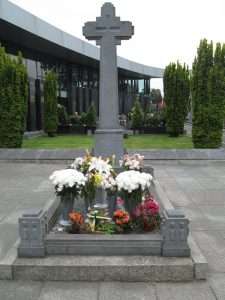On this day, one hundred years ago, the Anglo-Irish Treaty was signed. In adding his name to the document, Michael Collins perhaps signed his own death warrant, for there would undeniably be many among the ranks of Irish republicans who saw the Treaty as a betrayal.
In the long view, it is Collins who seems to have won the battle for the hearts of the Irish people.
I remember visiting Glasnevin Cemetery at the time of the Centenary of the Easter Rising. It was apparent from the abundance of flowers on his grave that Michael Collins was significantly more popular with visitors than Eamon de Valera. Perhaps it was a case of principle triumphing over political intrigue, more likely a case that youthful film star looks having greater appeal than images of an old and frail man.
Collins chose to commit himself to supporting the Treaty with Britain; de Valera chose to oppose it. Collins died in an ambush in August 1922 at the age of 31; de Valera completed his final term as president in June 1973 at the age of 90. But were there deeper differences?
Attitudes to the Treaty shaped Irish politics, but real political choices were never made. There has been a complete lack of any proper political discourse since the time of de Valera and Collins. The main parties differed on the 1921 Treaty, they did not differ on their fundamental understanding of the nature of Irish society.
The Republican ideal evaporated after independence as whole sectors of society were allowed to be controlled by the church, not just education but health care and social services became clerically dominated; there was to be no question of choice. Any measure that might have diluted the ecclesiastical dominance of society was resisted with vehemence, as was any legislation that might have taken the State in a direction not approved by the bishops.
While de Valera may have resisted McQuaid’s attempts to have the Catholic Church declared the established church in the 1937 Constitution, the funding of church activities that should properly have been the responsibility of the state represented a virtual endowment.
The state funding of Catholic institutions might have been expected to have given ministers leverage in their dealings with the church, yet the politicians seemed to forget themselves. They behaved as though Ireland were not a twentieth century democracy and deferred to the bishops in almost every matter. The image of people bending to kiss episcopal rings emblematic of all that was wrong, no political philosophy or biblical theology ever sanctioned such medieval obeisance. Otherwise educated, articulate and cosmopolitan politicians seemed to lose their critical faculty when dealing with the church.
In these past two years, it seems, that along with the decline of church influence, the days of Civil war politics might also pass. With both Civil War parties in government, it seems that there might be a greater emergence of robust arguments resting on differences in political philosophy.
There seems to be a passing of the politics that depended on whose side one’s forebear was in 1922, or who was one’s father, or whether one could claim credit for jobs coming to one parish and not another, or whether one could claim credit for obtaining planning permission for someone, or whether one had attended more local funerals than one’s opponent. Instead there seems the prospect of politics based on serious political debate.
